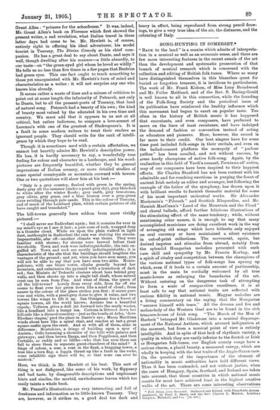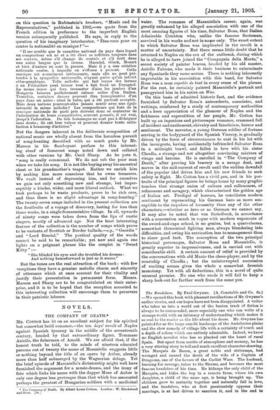" BACK to the land " is a maxim which
admits of interpreta- tion in a musical as well as an economic sense, and there are few more interesting features in the recent annals of the art than the development and systematic prosecution of that branch of musical research which is concerned with the collection and editing of British folk-tunes. Where so many have distinguished themselves in this blameless quest for buried or forgotten treasure, it is invidious to particularise. The work of Mr. Frank Kidson, of Miss Lucy Broadwood and Mr. Fuller Maitland, and of the Rev. S. Baring-Gould is well known to all in this connection, while the founding of the Folk-Song Society and the periodical issue of its publication have reinforced the healthy influence which this movement had begun to exert on popular taste. Too often in the history of British music it has happened that executants, and even composers, have preferred to move on the lines of least resistance, and have indulged the demand of fashion or convention instead of acting as educators and pioneers. Here, however, the record is far more to their credit. Our best singers have for some time past included folk-songs in their recitals, and even on the ballad-concert platform the monopoly of " parlour pathos" has been assailed, and not without success, by some hardy champions of native folk-song. Again, by. the realisation in this field of Verdi's counsel, Tcrrniamo all' antico, may of our composers have been inspired to their happiest efforts. Sir Charles Stanford has not been content with his admirable and far-reaching exertions in purging the fount of ancient Irish melody as editor and arranger, but following the example of the father of the symphony, has drawn upon it with brilliant results to furnish thematic material for some of his most important orchestral works. Sir Alexander Mackenzie's "Pibroch " and Scottish Rhapsodies, and Mr. Hamish MacCunn's "Land of the Mountain and the Flood" and choral ballads, afford further felicitous illustrations of the stimulating effect of the same tendency ; while, without mentioning other names, it is enough to say that many accomplished musicians are doing excellent work in the way of arranging old songs which have hitherto only enjoyed an oral currency or have maintained a silent existence in out-of-print collections. The movement, again, has derived impetus and stimulus from abroad, notably from the splendid Hungarian melodies presented with such rare skill and sympathy by Mr. Francis Korbay, and a spirit of rivalry and competition between the champions of the various national types of folk-songs has sprung up which, even if it leads to a certain amount of partisanship, must in the main be cordially welcomed by all true music-lovers as enlarging the boundaries of the art. Without entering on the dangerous task of attempting to form a scale of comparative excellence, it is at least safe to say that national traits are reflected with curious fidelity in national music. Magyar melodies are a living commentary on the saying that the Hungarian "amuses himself with tears." All the dreams and fire and melancholy of the Western Gael are to be found in the rich treasure-house of Irish song. " The March of the Men of Harlech" betrayed Mr. Gladstone into a musical disparage- ment of the National Anthem, which aroused indignation at the moment, but from a musical point of view is entirely intelligible. And in spite of that lack of rhythmic variety, a quality in which they are vastly inferior to the Scotch or Irish or Hungarian folk-tunes, our English county songs have a serious charm, a placid beauty, a measured energy, which are wholly in keeping with the best traits of the Anglo-Saxon race. On the question of the importance of the element of nationality in music authorities have held different views. Thus it has been contended, and not without justice, when the cases of Hungary, Spain, Scotland, and Ireland are taken into account, that those countries in which national music counts for most have achieved least in the highest creative walks of the art. There are some interesting observations • Folk Songs from Somerset. Gathered and Edited, with Pianoforte Acoom panimeut, by Cecil J. Sharp and the Key. Charles L. ?Larson. London, bimplen, Marshall, and Co. [5s. net.]
Representatives," published in 1892,—we quote from the French edition in preference to the imperfect English version subsequently published. He says, in reply to the question of his imaginary interlocutor, " Etes-vous pour ou centre in nationalite en musique "—
"Il me semble que le caractkre national du pays dans lequel un compositeur est ne et a etc Cleve se refletera ton ours dans
sex oeuvres, memo s'il change de centre° et s'il t dans une autre langue que in sienna. Haendel, Gluck, Mozart at bien d'antres en sont la preuve. Mais it y a une creation
nationale voulue, a laquelle on s'efforce it, present. Cette musique est assurement interessante, mais elle ne pout pre- tendre b la sympathie universelle, n'ayant pier° qu'un interet ethnographique. Telle meloclie qui fait verser des larmes un Finlandais pout laisser tout h fait froid un Espagnol. La meme danse qui fera tressauter d'aise les jambes d'un Hongrois laissera parfaitement calmos cellos d'un Italian. Toutefois, certaines danses peuvent etre transplantees d'un pays dans un autre : ainsi la valse, qui a ate partout acceptee. Mais deux nations pourront-elles jamais sentir avec une egale intensite la meme melodie P Les compositeurs qui font de la musique nationale de parti pris doivent done se contenter de l'admiration de leurs compatriotes, souvent poussee, it eat vrai, jnsqu'a l'adoration. De tels hommages ne sont pas it, dedaigner sans doute ; ils oat leur valour et peuvent donner toute satis- faction h. beaucoup d'artistes."
But the dangers inherent in the deliberate composition of national music are wholly absent from the harmless pursuit of song-hunting described with so much gusto by Mr. Marson in his flamboyant preface to this interest- ing sheaf of Somerset songs noted down and collated with other versions by Mr. Cecil Sharp. As he puts it, " song is really communal. We do not rob the poor man when we take his song. It is not like buying away his ancestral chest or his grandmother's teapot. Rather we enrich him by making him more conscious that he owns treasures. We exalt instead of depressing him, and for ourselves we gain not only something new and strange, but imper- ceptibly a kinder, wider, and more liberal outlook. What we took perhaps to be waste products, prove to be rich ores, and thus there is no slight advantage in song-hunting."
The twenty-seven songs included in the present collection are the firstfruits of a voyage of discovery, lasting for less than three weeks, in a single Somersetshire village. In all, upwards of ninety songs were taken down from the lips of rustic singers, mostly of advanced age. Not the least interesting feature of the collection is the number of songs which prove
to be variants of Scottish or Border ballads,—e.g., " Geordie" and " Lord Rendal." The poetical quality of the words
cannot be said to be remarkable ; yet now and again one lights on a poignant phrase like the couplet in " Sweet
" She blinded his eyes and she troubled his dreams : And nothing henceforward is just as it seems."
But the tunes are the real attraction of the book : with few 3xceptions they have a genuine melodic charm and sincerity
of utterance which at once account for their vitality and justify their presentation in permanent form. Messrs.
Marson and Sharp are to be congratulated on their enter- prise, and it is to be hoped that the reception accorded to this interesting collection will encourage them to persevere in their patriotic labours.
NOVELS.







































 Previous page
Previous page